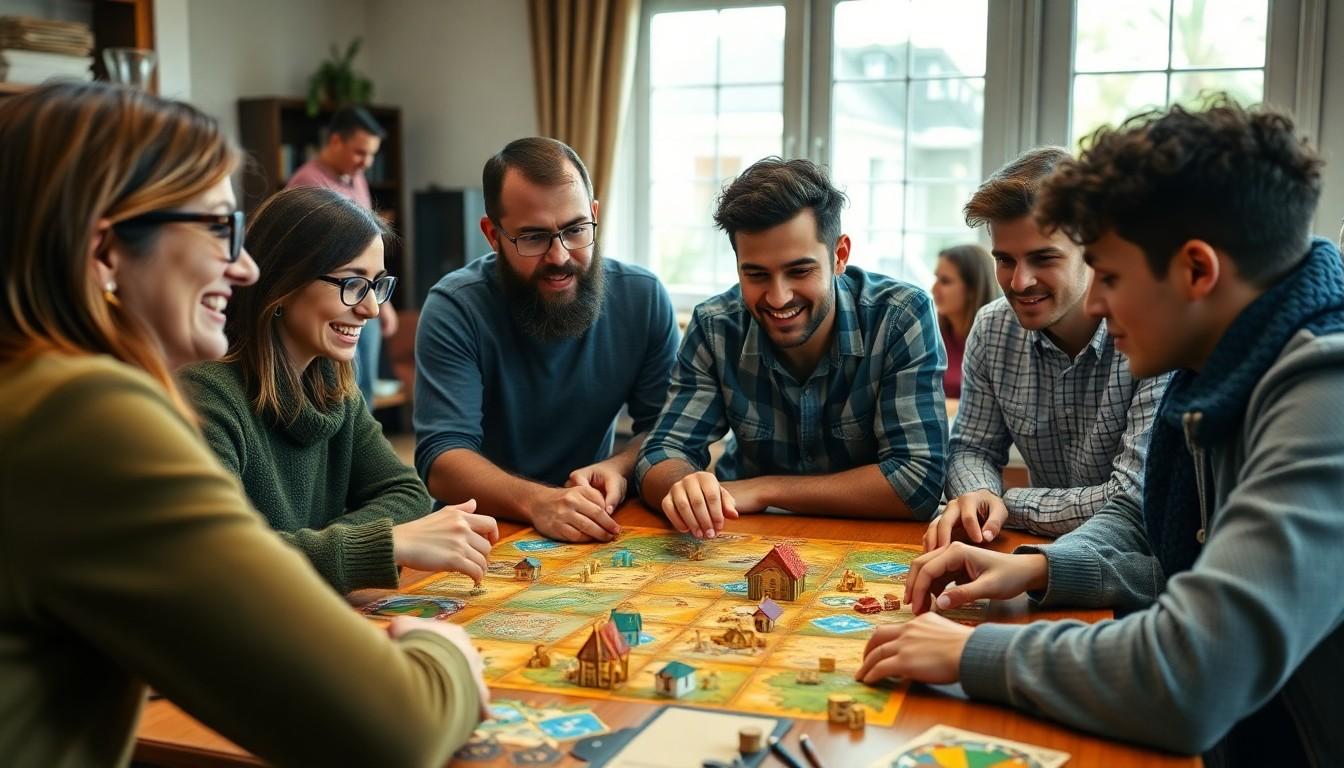Board games have come a long way from the days of rolling dice and moving pieces around a dusty old board. Today, they’re a vibrant blend of strategy, cunning, and a sprinkle of luck that can turn a quiet evening into a battlefield of wits. Whether you’re a seasoned strategist or a casual player looking for a good time, the world of popular strategy board games has something for everyone.
Overview Of Popular Strategy Board Games
Strategy board games engage players by requiring critical thinking and tactical planning. Various games appeal to diverse audiences, showcasing unique mechanics and themes.
Chess stands out as a classic, inviting players to command armies and outsmart opponents through calculated moves. Settlers of Catan blends resource management with negotiation, encouraging players to build settlements and trade resources.
Ticket to Ride emphasizes route building, where participants connect cities across a map, making strategic decisions about their paths. Carcassonne features tile placement, creating landscapes while scoring points through cities, roads, and fields.
Pandemic emphasizes teamwork, presenting a cooperative challenge to players who work together to stop global outbreaks. 7 Wonders involves card drafting, allowing players to develop civilizations over three ages, creating synergy through their choices.
Game complexity varies, catering to newcomers and veteran gamers alike. Scythe combines area control and economic strategy, immersing players into alternate history settings. Players find enjoyment in games like Terra Mystica, focusing on resource allocation and area control within diverse factions.
Popularity increases for lighter games too. King of Tokyo engages players in a monster-themed battle for city domination, balancing luck and strategy. Splendor introduces resource collection with a focus on acquiring development cards and building economic engines.
This landscape of strategy board games constantly evolves. Innovations and expansions provide fresh experiences, enhancing replayability and engaging communities across the globe.
Key Characteristics Of Strategy Board Games

Strategy board games exhibit several defining traits that enhance player experience. Players engage in thoughtful decision-making, planning, and tactical execution.
Complexity And Depth
Depth and complexity characterize strategy board games. Many of these games require players to grasp intricate rules and mechanics. Chess exemplifies this through its multifaceted gameplay, where each move can lead to various outcomes. Settlers of Catan introduces resource management, requiring players to balance their needs with those of others. Players often spend several hours on games like Twilight Imperium, which demands extensive planning and strategic foresight. Engaging with these complex systems fosters critical thinking and enriches the overall experience.
Player Interaction
Engagement between players often drives the excitement in strategy board games. Varied interactions create dynamic gameplay experiences. In games like Diplomacy, negotiation shapes outcomes while forming and breaking alliances. Players in 7 Wonders engage in card drafting, influencing each other’s strategies. Combative games, such as Risk, necessitate confrontations that spark tensions and rivalries. Cooperative titles, like Pandemic, emphasize teamwork and collaboration. The range of interactions cultivates a social atmosphere, enhancing enjoyment and connection among players.
Top Popular Strategy Board Games
A variety of strategy board games capture the interest of players around the world. Each game brings unique mechanics and engaging experiences.
Game 1: Catan
Catan requires players to trade and build while gathering resources. In this strategy game, the primary objective is to reach 10 victory points through settlement construction and development. Players strategically place roads and settlements on a hexagonal board, competing for prime locations. Resources include wood, brick, wheat, ore, and sheep, encouraging negotiation and trade among players. The unpredictable nature of resource generation keeps the gameplay dynamic and engaging.
Game 2: Ticket To Ride
Ticket to Ride revolves around building train routes across North America. Players collect train cards to claim routes and connect cities, earning points for completed tickets. The game blends strategy and luck, requiring players to anticipate opponents’ moves while pursuing their objectives. Varied ticket requirements allow for different play styles, making every session unique. The colorful board and components enhance the visual appeal, attracting both casual and serious gamers.
Game 3: Carcassonne
Carcassonne is a tile-placement game focusing on city and landscape construction. Players draw tiles with features such as cities, roads, and fields, which they then place on the board. Completing features allows players to score points by deploying followers strategically. Each tile placement offers a tactical decision, and the interplay between players adds depth to the experience. Expansions introduce new elements and increase replayability, appealing to dedicated fans.
Game 4: Terra Mystica
Terra Mystica features asymmetric factions vying for control of a fantasy landscape. Each player governs a unique civilization with distinct abilities and requirements for expansion. Strategy revolves around territory control, resource management, and building structures. Players develop towns, temples, and strongholds, creating complex interdependencies. The board fosters competition and alliances, emphasizing deep strategic planning and careful decision-making.
Game 5: Pandemic
Pandemic is a cooperative game where players work together to halt global outbreaks. Each player assumes a specific role, utilizing unique abilities to combat diseases. Strategy hinges on collaboration, as planning and communication dictate success. The game presents an ever-evolving board, where the threat of infections escalates. Achieving objectives requires efficient resource management and coordinated actions, fostering a sense of teamwork and urgency among players.
Tips For Choosing The Right Strategy Board Game
Consider the number of players. Selecting a game that accommodates everyone ensures a fun experience. Player count should align with the game’s design, as some games excel with larger groups, while others shine with fewer participants.
Evaluate the complexity of the game. Beginners benefit from lighter games, which feature straightforward rules. More experienced players often prefer those with intricate strategies, offering deeper challenges.
Assess the game duration. Some strategy games require two hours or more, while others can be enjoyed in under an hour. Matching game length to available time can enhance enjoyment and reduce frustration.
Explore themes and mechanics. Games like Settlers of Catan focus on resource management, while Ticket to Ride emphasizes route building. Depending on personal interests, selecting a theme that resonates leads to a more engaging experience.
Read reviews and watch gameplay videos. Gathering insight from other players provides useful perspectives on game mechanics and enjoyment. Sources like BoardGameGeek and YouTube channels often feature in-depth analyses.
Check for expansions and variations. Many popular strategy board games offer expansions that introduce new elements and enhance replayability. This factor can significantly enrich the overall gaming experience over time.
Determine the level of player interaction required. Games such as Diplomacy encourage negotiation, while cooperative games like Pandemic foster teamwork. Selecting a game that aligns with the desired social dynamic creates a more enjoyable environment.
Understand your group’s preferences. Each gaming group has unique tastes, which can influence the choice of game. Consider surveying players beforehand to find common interests, ensuring everyone has a great time.
Conclusion
Strategy board games offer a rich tapestry of experiences that engage players in thoughtful decision-making and tactical planning. With options ranging from classic games like Chess to modern favorites such as Settlers of Catan and Pandemic, there’s something for every type of gamer.
The blend of competition and cooperation found in these games fosters a unique social dynamic that enhances enjoyment. Whether one prefers a light-hearted game or a deep strategic challenge, the right choice can lead to countless memorable moments. Exploring the diverse themes and mechanics in strategy board games not only entertains but also sharpens critical thinking skills. Embracing this vibrant gaming culture can lead to endless hours of fun and connection with friends and family.



